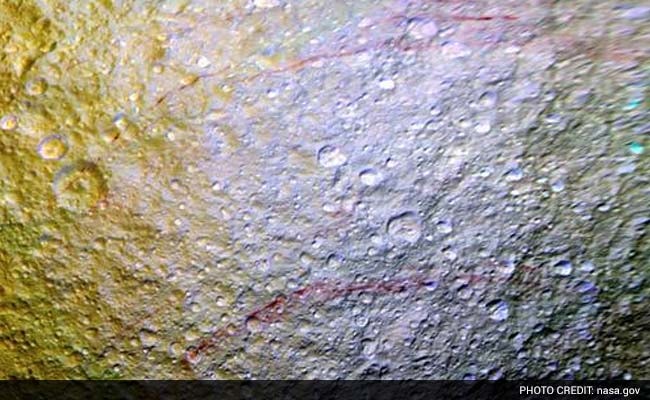
File Photo: Unusual Red Arcs seen on Icy Saturn Moon
Washington:
Like graffiti sprayed by an unknown artist, NASA's Cassini spacecraft has spotted unexplained arc-shaped, reddish streaks on the surface of Saturn's icy moon Tethys.
The red arcs are narrow, curved lines on the moon's surface, and are among the most unusual colour features on Saturn's moons to be revealed by Cassini's cameras, the US space agency said in a statement.
"The red arcs really popped out when we saw the new images. It is surprising how extensive these features are," said Cassini participating scientist Paul Schenk from the Lunar and Planetary Institute in Houston.
A few of the red arcs can be seen faintly in observations made earlier in the Cassini mission.
But the colour images are the first to show large northern areas of Tethys under the illumination and viewing conditions necessary to see the arcs clearly.
The origin of the features and their reddish color is a mystery to Cassini scientists.
Possibilities being studied include ideas that the reddish material is exposed ice with chemical impurities or the result of outgassing from inside Tethys.
They could also be associated with features like fractures that are below the resolution of the available images.
Except for a few small craters on Saturn's moon Dione, reddish-tinted features are rare on other moons of Saturn.
Many reddish features do occur, however, on the geologically young surface of Jupiter's moon Europa.
"The red arcs must be geologically young because they cut across older features like impact craters, but we don't know their age in years," added Paul Helfenstein, Cassini imaging scientist at Cornell University in New York.
The Cassini team is currently planning follow-up observations of the features at higher resolution later this year.
After 11 years in orbit, Cassini continues to make surprising discoveries, the statement read.
The red arcs are narrow, curved lines on the moon's surface, and are among the most unusual colour features on Saturn's moons to be revealed by Cassini's cameras, the US space agency said in a statement.
"The red arcs really popped out when we saw the new images. It is surprising how extensive these features are," said Cassini participating scientist Paul Schenk from the Lunar and Planetary Institute in Houston.
A few of the red arcs can be seen faintly in observations made earlier in the Cassini mission.
But the colour images are the first to show large northern areas of Tethys under the illumination and viewing conditions necessary to see the arcs clearly.
The origin of the features and their reddish color is a mystery to Cassini scientists.
Possibilities being studied include ideas that the reddish material is exposed ice with chemical impurities or the result of outgassing from inside Tethys.
They could also be associated with features like fractures that are below the resolution of the available images.
Except for a few small craters on Saturn's moon Dione, reddish-tinted features are rare on other moons of Saturn.
Many reddish features do occur, however, on the geologically young surface of Jupiter's moon Europa.
"The red arcs must be geologically young because they cut across older features like impact craters, but we don't know their age in years," added Paul Helfenstein, Cassini imaging scientist at Cornell University in New York.
The Cassini team is currently planning follow-up observations of the features at higher resolution later this year.
After 11 years in orbit, Cassini continues to make surprising discoveries, the statement read.
Track Latest News Live on NDTV.com and get news updates from India and around the world

